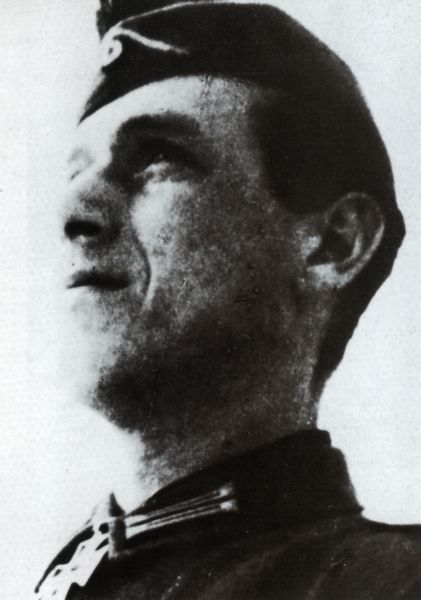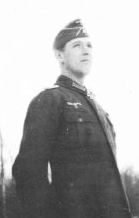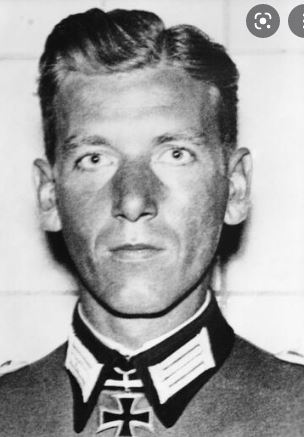Fricke, Ernst-August (Infanterie-Regiment 76)
- Date of birth:
- May 11th, 1911 (Hamburg-Altona, Germany)
- Date of death:
- November 9th, 1943 (Königsberg, Eastern Prussia, Germany)
- Buried on:
- German War Graves Hamburg-Altona
Plot: XVI. Grave: 20a. - Nationality:
- German
Biography
Promotions:
1930: Polizeischüler
1935: Unteroffizier
1940: Leutnant
1940: Oberleutnant
1942: Hauptmann
1943: Major
1943: Oberstleutnant posthum
Career:
1930: entered the Hamburger Polizei
01.08.1935: entered as Unteroffizier in the Infanterie-Regiment 76
1939: campaign in Poland
01.02.1940: activated and promoted to Leutnant
05.1940: campaign in France and promotion to Oberleutnant as Chef - 7. Kompanie / Infanterie-Regiment 76
06.1941: campaign in Russia
Winter 1941/42: distinguished himself during the retreat from Tichwin to Wolchow
01.02.1942: promoted to Hauptmann
07.1942: Kommandeur - II. Bataillon / Infanterie-Regiment 76 - 20. ID
01.01.1943: promoted to Major
08.1943: distinguished himself again during the fightings for the strategic road north of Orel
13.08.1943: severely WIA and sent to the Lazarett near Königsberg
Ernst-August Fricke died on 9th November 1943, by the wounds received on 13th August 1943 and posthumously promoted to Oberstleutnant.
Do you have more information about this person? Inform us!
- Period:
- Second World War (1939-1945)
- Awarded on:
- November 6th, 1939
- Period:
- Second World War (1939-1945)
- Awarded on:
- July 24th, 1941
- Period:
- Second World War (1939-1945)
- Rank:
- Oberleutnant (1st Lieutenant)
- Unit:
- Chef, 7. Kompanie, Infanterie-Regiment 76 (motorisiert), 20.Infanterie-Division, XXXIX. Armee-Korps, 16. Armee, Heeresgruppe Nord
- Awarded on:
- January 17th, 1942
“The position of the Infanterie-Regiment 76 (located southwest of the railway junction west of Ostrowo) was of decisive importance for the march movements of the XXXIX. Armee-Korps. Utilizing the advantages of the impenetrable ancient forest, the regiments of the Russian 4th Guards-Division assailed this position for days, yet in vain. Oberleutnant Fricke led his gathered up troops forwards with unstoppable energy, overran three enemy blocking lines, captured (among other things) 10 mortars, and eliminated the entire enemy garrison. This decisive success alone enabled the Regiment to continue to keep the railroad junction under friendly control, a success which by consequence was critical for the movements of the XXXIX. Armee-Korps.”
816th Award.
- Period:
- Second World War (1939-1945)
- Rank:
- Major
- Unit:
- Kdr, II. Bataillon, Grenadier-Regiment (motorisiert) 76, 20. Panzergrenadier-Division, Heer
- Awarded on:
- June 27th, 1943
1872nd Award.
- Period:
- Second World War (1939-1945)
- Rank:
- Major
- Unit:
- Kommandeur, II. Bataillon, Grenadier-Regiment 76 (motorisiert), 20.Panzergrenadier-Division, LIII. Armee-Korps, 9. Armee, 4. Panzer-Armee
- Awarded on:
- November 30th, 1943
“At the end of July 1943 Major Fricke and his Hessian-Thüringian Bataillon were able to repel the repeated attacks of far numerically superior enemy forces that were trying to force their way through to an important German supply road north of Orel. While Major Fricke was fending off the frontal attacks set against him, the Soviets penetrated into the sector of the left neighbour in regimental strength. Major Fricke immediately set up a blocking line, personally directed every single man into position while under strong artillery/mortar fire, and inspired the men of every resistance nest to fight to the utmost. By this he laid the groundwork for the creation of a new defensive front.”
341st Award.
Awarded posthumously
- Period:
- Second World War (1939-1945)
- Awarded on:
- July 25th, 1942
- Period:
- Second World War (1939-1945)
- Period:
- Second World War (1939-1945)
- Period:
- Second World War (1939-1945)
- Period:
- Second World War (1939-1945)
- Rank:
- Major
- Awarded on:
- 1943
Sources
- Photo 1: Wehrkundearchiv
- Photo 2:
- Photo 3:
- Photo: Deutsches Wehrkundearchiv
- - WEGMANN, GüNTER, Die Ritterkreuzträger der Deutschen Wehrmacht 1939-1945, Biblio Verlag, Osnabrück, 2010.
- Die Ordensträger der Deutschen Wehrmacht (CD), VMD-Verlag GmbH, Osnabrück, 2002
- Kwasny A., Kwasny G., Die Eichenlaubträger 1940-1945 (CD), Deutsches Wehrkundearchiv, Lage-Waddenhausen, 2001
- Fellgiebel W.P., Elite of the Third Reich, The recipients of the Knight's Cross of the Iron Cross 1939-1945: A Reference, Helion & Company Limited, Solihull, 2003, ISBN 1-874622-46-9
- 20.Panzergrenadierdivision














